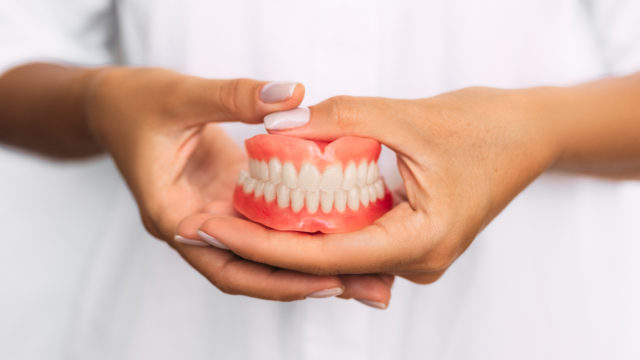Missing teeth are not unusual in America. In fact, around 40 million Americans have lost all of their natural teeth and around 178 million have lost at one! Prosthodontists, dental specialists, aim to restore smiles using various techniques, like dentures.
If you have a missing tooth or teeth, dentures could be an option for restoring your smile. Let’s take a look at what dentures are and how they could help you get the smile you desire!
What Are Dentures?
Dentures are synthetic teeth designed to replace one or more missing teeth. Thanks to modern technology, we have more options than ever before to restore smiles so that you can eat and speak normally. Dentures also provide the facial structure that’s lost when you have too many missing teeth.
Read more: Cosmetic Dentistry: Smile Makeover for 2022
What Are the Types of Dentures?
Somebody who is missing a few teeth requires a different treatment than a person missing all of their teeth. Further, it’s possible for somebody to need more support due to bone loss. That’s where the different types of dentures come into play.
1. Full Dentures
Also known as complete dentures, these removable dentures can replace all teeth. They can help you eat normally, but there are some drawbacks making complete dentures a last option for most people.
- Full dentures don’t anchor to the jawbone, so you won’t chew exactly the same way as you did with your natural teeth. Some patients have difficulty speaking with complete dentures and may develop a lisp.A full set of false teeth doesn’t stop bone loss, and if the dentures don’t fit well then it could expedite the process.
2. Fixed Partial Dentures
Commonly known as implant-supported bridges, this type of denture works for people missing one or a few teeth in a row. It’s an option if the remaining teeth on either side of the gap are strong enough to serve as anchors.
Implant supported dentures improve facial and oral structure while maintaining a consistent tooth position to improve your bite. Many people prefer the idea of more permanent dentures, making this type an ideal solution. However, there are a few disadvantages:
- The natural teeth used as anchors, or abutments, are at more risk for decay.
- There is potential for injury to the other tooth tissues.
- Replacing fixed dentures can be pricey.
3. Removable Partial Dentures
Removable Partial Dentures work well for people who are missing a few teeth and prefer a removable option. Sometimes called snap on dentures, removable partial dentures consist of artificial teeth affixed to a plastic base that snap into place.
Snap in dentures can look, feel, and act like your natural teeth. You can remove them for cleaning, and they are easily replaced. It’s an excellent choice for those who can’t get implant retained dentures.
4. Implant Retained Dentures
Implant retained dentures, also known as overdentures or implant overdentures are like hybrid dentures. They attach to anchors in your mouth to provide excellent support for chewing and speaking, plus the denture implants help support the bone.
This type of denture relies on an anchor for the connection and provides excellent support for chewing and speaking. Overdentures must be removed at night for cleaning and to allow the gum tissues to rest.
5. Flexible Dentures
Traditional dentures are rigid due to the materials used in construction, like metal and acrylic. Flexible dentures use thermoplastics to create thinner, bendable, and more comfortable dentures. There are several benefits to using flexible partial dentures:
- They don’t absorb stains or odors.
- You get a natural look and feel.
- Skip the denture adhesives because flexible dentures adhere to your gums.
- They are quicker and easier to make and fit than the traditional alternatives.
That’s not to say that there aren’t drawbacks to using flexible dentures. They are more expensive and can lead to more bacteria buildup than traditional dentures.
6. Immediate Dentures
Commonly known as same day or one day dentures, this type offers a solution for patients who want dentures the same day they have their teeth extracted. While you typically have to wait six to eight weeks to get traditional dentures, same day dentures can go in immediately.
Read more: Rebuild Your Smile with Veneers
Are Dentures the Same as False Teeth?
Dentures are commonly referred to as false teeth because they replace missing natural teeth. You can get upper dentures or bottom dentures, or even upper partial dentures for front teeth, but they are all false teeth!
What to Expect When Getting Dentures?
Getting dentures begins with your dental team taking impressions and measurements of your teeth and jaw. Those impressions and measurements help specialists create a plaster model that can then be used to create your dentures.
Technicians place artificial teeth and gum tissue to fit the spaces and develop your dentures. They send the completed product to your dentist for a fitting, and your dental team can make any adjustments.
Can I Get My Teeth Pulled and Get Dentures on the Same Day?
It is possible to get same day dentures, or temporary dentures, so that you don’t have to go weeks without teeth. The downside of getting dentures in a day is that they can loosen as your mouth adjusts to not having your natural teeth. However, since they offer a temporary solution while you wait for your permanent replacements, a little discomfort may be preferable to walking around without teeth.
Can I Get a Single Tooth Denture?
Yes, it is possible to get a single tooth denture if that’s all you need.
How to Care for Dentures?
Proper denture care is crucial to prevent bad breath, bone loss, and infections. If you have removable dentures, you need to remove them daily for basic care that should include:
- Gently brushing the dentures to remove buildup. Be careful not to drop them because they can break.
- Soak the dentures overnight using a commercial denture cleaner or diluted white vinegar mixture.
- Brush your dentures in the morning before inserting them for the day.
Can You Sleep in Dentures?
Technically, you can sleep in dentures, but it’s not a good idea long-term. Your gums need a break from wearing them, and as noted above, overnight soaking is a critical step in keeping your dentures clean.
How Much Do Dentures Cost?
Before you start any treatment, it helps to know how much it will cost. The cost of dentures depends on what type you choose and whether you need full or partial dentures.
How Much Do Full Dentures Cost?
Full dentures start at around $1300 and can cost more than $4000.
How Much Do Partial Dentures Cost?
Partial dentures cost between $1300 and $2000 on average.
How Can I Get Affordable Dentures?
Dentures can be expensive, but there are ways to offset at least some of the costs. If you have dental insurance, it may cover part of the cost. At Jefferson Dental & Orthodontics, we offer a Dental Savings Plan that can reduce the cost of dentures, and we offer flexible payment plans to help you get the treatment you need.
If you want to learn more about dentures and how they could help restore your smile, contact the Jefferson Dental & Orthodontics office nearest you. Book an appointment to discuss your options with our team!




